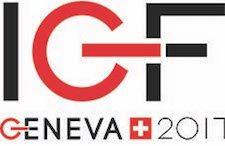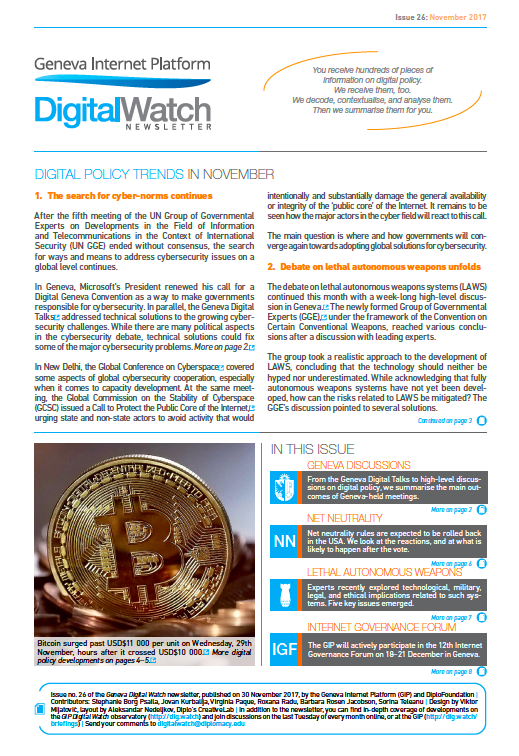
DiploNews – Issue 337 – 15 December 2017
DiploFoundation and Geneva Internet Platform at 12th Internet Governance Forum

- Just-in-time reporting: The GIP Digital Watch observatory will provide just-in-time session reports from the IGF, and IGF Daily newsletters, which will be available on a dedicated webpage, at dig.watch/igf2017.
- Art@ IGF exhibition: How can digital arts shape our digital future? IGF participants are invited to the opening of ART@IGF, on Monday, 18th December, at 14:00 CET, at the Palais des Nations. Visit the exhibition and join the art ride.
- Meet-and-Greet: Meet the author of An Introduction to Internet Governance, Dr Jovan Kurbalija, on Tuesday, 19th December, at 13:30 CET, at the Diplo booth, IGF Village, Palais des Nations.
- Workshops: The GIP is co-organising the following workshops at the IGF: Data governance and policy: Developing a curriculum (WS186), on Monday, 18th December, 09:00–10:30 CET, Room XI – A, and A Digital Geneva Convention to protect cyberspace (WS34), Tuesday, 19th December, 10:40–12:10 CET, Room XXI – E.
- Data track: The GIP is also coordinating a data track at the IGF, consisting of seven data-related open forums, organised by international organisations.
- Alumni gathering: Diplo alumni and friends are invited to join the get-together on Monday, 18th December, at 13:30 CET at the UN cafeteria (first floor of building E) for mingling, updates on Diplo’s work and opportunities, and a group photo.
- Visit our booth: Diplo and the GIP will have a dedicated booth at the IGF Village (booth no 16). Visit us throughout the week to get your copies of the IGF Daily newsletters, and other Internet-governance-related publications.
3rd Geneva Engage Awards honour Geneva actors for social media engagement
On 11 December, DiploFoundation, the Geneva Internet Platform, and the Canton of Geneva awarded the Geneva Engage Awards to actors in International Geneva in recognition of the effectiveness of their social media engagement in 2017. This year’s winners were the Delegation of the EU to the UN in Geneva (in the Permanent Missions category ), the World Wide Fund for Nature (in the NGO category ) and the UN Office at Geneva (in the International Organisations category). Learn more about the event, take a look at the photos and the recording:

read the press release, or examine the social media analysis report, which contains the social media engagement scores of organisations and permanent missions in Geneva.
Students graduate with a Master in Contemporary Diplomacy

The graduation ceremony took place on 6 December at the Jesuit’s Church in Valletta, Malta. View the photo gallery. The graduation was the culmination of months of study and hard work. DiploFoundation congratulates the students on their graduation, and thanks its faculty members who supervised the work of these graduates.
Upcoming study and training opportunities
Humanitarian Diplomacy Diploma course
Apply now for the next session of the popular online course Humanitarian Diplomacy, offered in cooperation with the International Federation of Red Cross and Red Crescent Societies (IFRC). This highly interactive 13-week course, led by Ambassador Christopher Lamb and a team of experienced practitioners, extends the knowledge base and develops practical skills of current and future practitioners in humanitarian diplomacy and policy. The course familiarises participants with basic definitions, concepts, actors, and institutions in the field of humanitarian diplomacy; introduces international humanitarian law; hones advocacy and negotiation skills; develops participants’ research skills; and increases their understanding of national and regional humanitarian diplomacy activities. The course is offered in English; however, participants have the option to write and submit major course assignments and the final research paper in French or Spanish. The next session starts 19 February 2018 and the application deadline is 15 January 2018. Please visit the course webpage to read more and apply.
Capacity Development
Capacity development has been emerging as a central approach within development for more than two decades. To help development professionals better understand and master this paradigm, this interactive course, offered in cooperation with the Learning Network for Capacity Development (LenCD), introduces the key concepts, principles, and values of capacity development. The main focus is on building practical skills for better design, planning, implementation, and assessment of capacity development initiatives. The course is taught online by Jenny Pearson and Carol Kiangura. The next session starts 19 Feburary 2018 and the application deadline is 15 January 2018. Please visit the course webpage to read more and apply.
Just-in-time course on Digital Commerce
This Digital Commerce course aims to assist permanent missions and international organisations in Geneva in increasing their knowledge and capacity to engage in multilateral digital commerce-related negotiations and discussions. It provides an interdisciplinary coverage of e-commerce, from both digital and trade perspectives. While improving their knowledge of e-commerce, participants will also gain the practical skills and information required to discuss specific digital policy aspects, such as cross-border data flows, data localisation, cybersecurity, consumer protection, and the implication of emerging technologies to digital trade, such as the Internet of Things and 3D printing. It is aimed particularly at participants from developing and least developed countries (LDCs), based in Geneva. The course is delivered by DiploFoundation (Diplo), CUTS International Geneva, the International Trade Centre (ITC), and the Geneva Internet Platform (GIP). It is supported by the United Nations Conference on Trade and Development (UNCTAD) and funded by the UK Foreign & Commonwealth Office (FCO). The next session starts 29 January 2018 and the application deadline is 15 January 2018. Please visit the course page to learn more and apply.
February 2018 online diplomacy courses
Start the new year with one of our most popular online courses:
- Diplomatic Theory and Practice
- Public Diplomacy
- Introduction to Internet Governance
Apply by 18 December 2017 for University of Malta accredited courses and by 15 January 2018 for Diplo certificate courses. For further information or to apply, click on the titles of the courses listed, or visit our courses webpage. Register now to reserve your place.
Malta scholarships
Thanks to support from the government of Malta, partial scholarships are available for applicants from developing countries to attend upcoming Diplo online courses. These scholarships cover 30–60% of course fees and can be applied to most online courses in 2018. Browse our course catalogue and contact us at admissions@diplomacy.edu for further information. You can also sign up for our courses mailing list to be informed about upcoming courses.
Leading IG book is UN Library’s Book of the Month
The book An Introduction to Internet Governance, by Dr Jovan Kurbalija, has been selected as the #BookoftheMonth for December by the United Nations Library in Geneva. Now in its 7th edition, it has been translated into 10 languages and has been adapted as a textbook for academic courses worldwide. For more details about the book, visit the book’s webpage. Visit the website of the United Nations Library in Geneva to learn more about the library’s collection and archives.
November’s Geneva Digital Watch in French, Spanish, and Bahasa Indonesian

The newsletter provides the latest digital policy updates which took place in November. Highlights include an analysis of the rollback of US net neutrality rules, and an overview of the main issues raised during the LAWS debates of the Group of Governmental Experts.
E-commerce for development: e-Residency for the inclusion of SMEs in global markets
On 4 December, Diplo and e-Residency hosted a webinar to discuss the inclusion of small businesses from developing countries and least developed countries (LDCs) in global value chains. Among other topics, the webinar focused on how the e-Residency programme in Estonia can facilitate access to global markets by enabling the establishment of an EU company that can be managed online, and by providing access to EU banking and international payment providers through e-Residency. It also touched on related topics, such as discussions on e-commerce at the World Trade Organization (WTO) and the impact of the EU General Data Protection Regulation (GDPR) on businesses. The recording is available online:

What’s been happening in Diplo’s blogsphere
In Who is learning online, Diplo’s Educational Programmes Director Hannah Slavik reflects on why access to online learning is unequal and highlights persisting reasons for exclusion. Using the example of two individuals, she explains why some people will be unlikely to engage in online learning even though they have access to the Internet and could benefit from online learning. She then asks what online learning can do for poor and marginalised people and provides suggestions towards bridging the gap. In his two-part blog post ‘Diplomacy in the age of Trump’ (part one, part two), Ambassador Laurence Pope, looks at recent developments in US diplomacy. He begins by putting the US Foreign Service into historical perspective. He then points out that the service is badly neglected, with key posts in strategic locations yet to be filled. He also criticises the record of current Secretary of State Rex Tillerson. Pointedly, he argues that the neglect of the Foreign Service, which has characterised US national security bureaucracy since the end of the Cold War, ‘has [now] been replaced by an active attempt to destroy it’.

